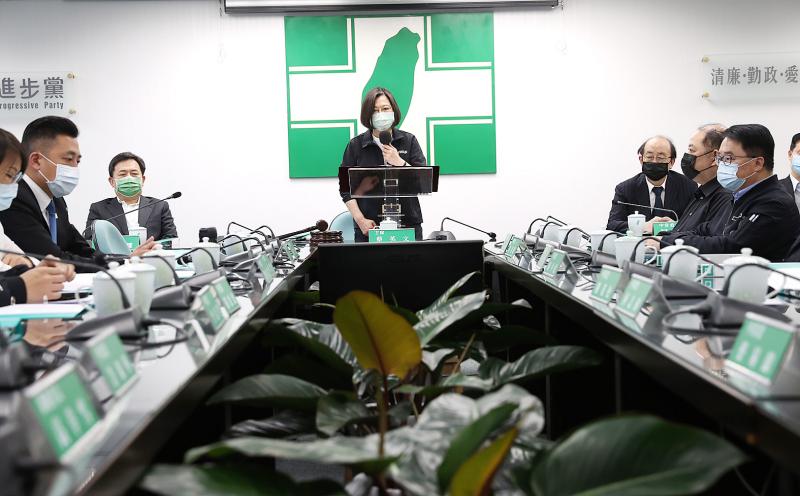President Tsai Ing-wen (蔡英文) yesterday laid out three major areas of reform for the Taiwan Railways Administration (TRA) following Friday last week’s fatal train crash, saying that there is no need to doubt the government’s determination, as reforming the agency is its “unshirkable responsibility.”
Tsai made the remarks in a speech ahead of a Democratic Progressive Party Standing Committee meeting, during which she observed a minute’s silence for the victims of the Taroko Express crash, which killed 50 people and injured more than 200 after colliding with a truck as it was about to enter the Cingshuei Tunnel (清水隧道) in Hualien’s Sioulin Township (秀林).
The accident “has affected everyone in the nation,” she said.

Photo: CNA
“Everyone is mourning the passengers who lost their lives and are dismayed at the death of the young conductor,” she said, adding that because of this, “reforming the TRA is imperative.”
The three main tasks are to solve problems in the agency’s organizational culture, fix its longstanding financial woes and discuss the best business model moving forward, the president said.
Organizational adjustments would ensure that issues could be solved regionally, thereby increasing management efficiency and safety, she said.
For example, each of the four major work units essential for running the railways should be able to communicate horizontally among themselves, rather than going through a superior, she said.
As many have mentioned, instilling a safety-centric mindset and safety standards among construction workers is of the utmost importance, she added.
No matter the agency’s business model, if management and safety issues are left unsolved, then the public’s expectations would remain unmet, Tsai said.
Fixing the agency’s financials is next on the agenda, Tsai said.
The TRA operates many unprofitable rail lines for the public good, causing it to consistently run at a loss, she said.
Add to that worker pensions, asset activation and other expenses, and it adds up to a huge financial burden that harms not only worker morale, but also operational efficiency and safety, she added.
Without a stable profit, any other reforms could face resistance, she said.
If management and safety can be improved and financial troubles eased, then there would be more space to discuss the best long-term business model for the TRA, she added.
Many reforms have been initiated, but before their effects are seen, it is difficult to avoid criticism, Tsai said, but added that people should not doubt the government’s resolve.
The fruits of government policy over the past five years are slowly becoming tangible, “proving that we have never been afraid to approach difficult reforms,” she added.
“When it comes to the TRA, our view is much the same,” Tsai said. “People everywhere in Taiwan deserve to have a safe path home. Reforming the agency is our unshirkable responsibility.”
Meanwhile, the Taiwan Railway Labor Union said it is glad to see the president show determination in conducting comprehensive reform of the TRA.
“We will see how determined the government is in reforming the agency,” the union said.
“We absolutely support reasonable reform, but the government should not think that turning the TRA into a private or state-run corporation would serve as an all-inclusive solution to all of the problems,” it added.
Additional reporting by Shelley Shan

SECURITY: As China is ‘reshaping’ Hong Kong’s population, Taiwan must raise the eligibility threshold for applications from Hong Kongers, Chiu Chui-cheng said When Hong Kong and Macau citizens apply for residency in Taiwan, it would be under a new category that includes a “national security observation period,” Mainland Affairs Council (MAC) Minister Chiu Chui-cheng (邱垂正) said yesterday. President William Lai (賴清德) on March 13 announced 17 strategies to counter China’s aggression toward Taiwan, including incorporating national security considerations into the review process for residency applications from Hong Kong and Macau citizens. The situation in Hong Kong is constantly changing, Chiu said to media yesterday on the sidelines of the Taipei Technology Run hosted by the Taipei Neihu Technology Park Development Association. With

CARROT AND STICK: While unrelenting in its military threats, China attracted nearly 40,000 Taiwanese to over 400 business events last year Nearly 40,000 Taiwanese last year joined industry events in China, such as conferences and trade fairs, supported by the Chinese government, a study showed yesterday, as Beijing ramps up a charm offensive toward Taipei alongside military pressure. China has long taken a carrot-and-stick approach to Taiwan, threatening it with the prospect of military action while reaching out to those it believes are amenable to Beijing’s point of view. Taiwanese security officials are wary of what they see as Beijing’s influence campaigns to sway public opinion after Taipei and Beijing gradually resumed travel links halted by the COVID-19 pandemic, but the scale of

A US Marine Corps regiment equipped with Naval Strike Missiles (NSM) is set to participate in the upcoming Balikatan 25 exercise in the Luzon Strait, marking the system’s first-ever deployment in the Philippines. US and Philippine officials have separately confirmed that the Navy Marine Expeditionary Ship Interdiction System (NMESIS) — the mobile launch platform for the Naval Strike Missile — would take part in the joint exercise. The missiles are being deployed to “a strategic first island chain chokepoint” in the waters between Taiwan proper and the Philippines, US-based Naval News reported. “The Luzon Strait and Bashi Channel represent a critical access

Pope Francis is be laid to rest on Saturday after lying in state for three days in St Peter’s Basilica, where the faithful are expected to flock to pay their respects to history’s first Latin American pontiff. The cardinals met yesterday in the Vatican’s synod hall to chart the next steps before a conclave begins to choose Francis’ successor, as condolences poured in from around the world. According to current norms, the conclave must begin between May 5 and 10. The cardinals set the funeral for Saturday at 10am in St Peter’s Square, to be celebrated by the dean of the College